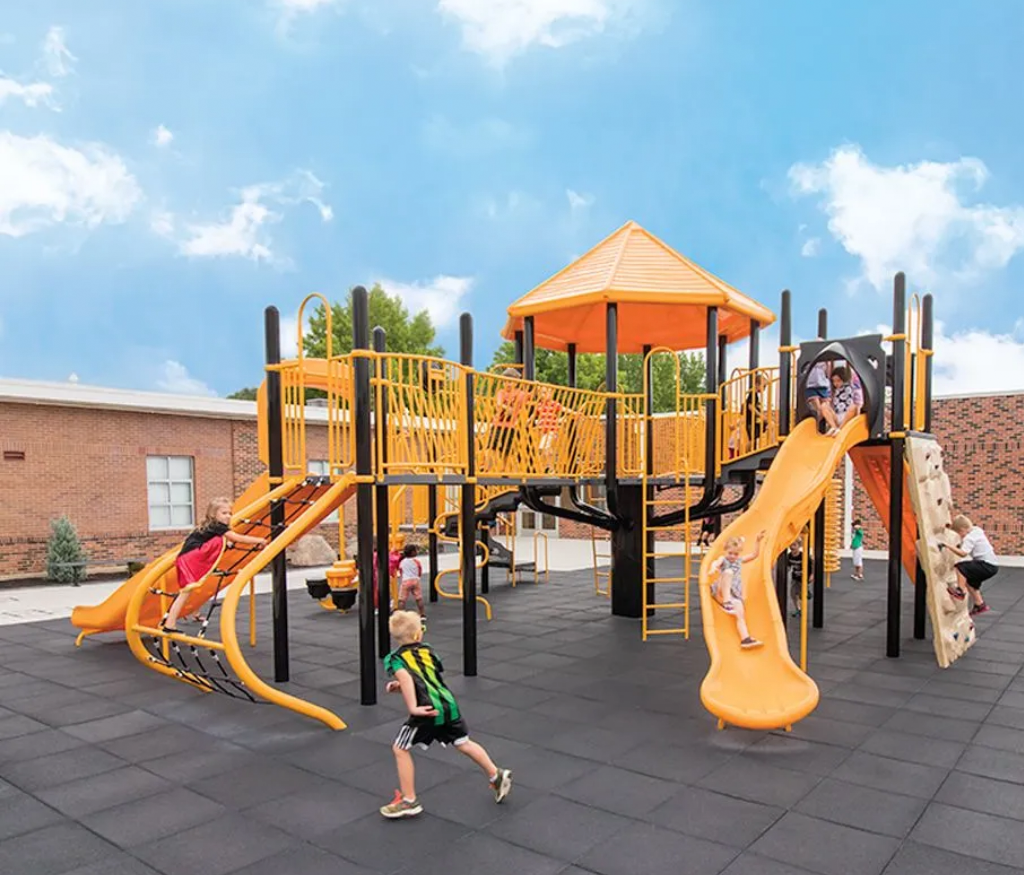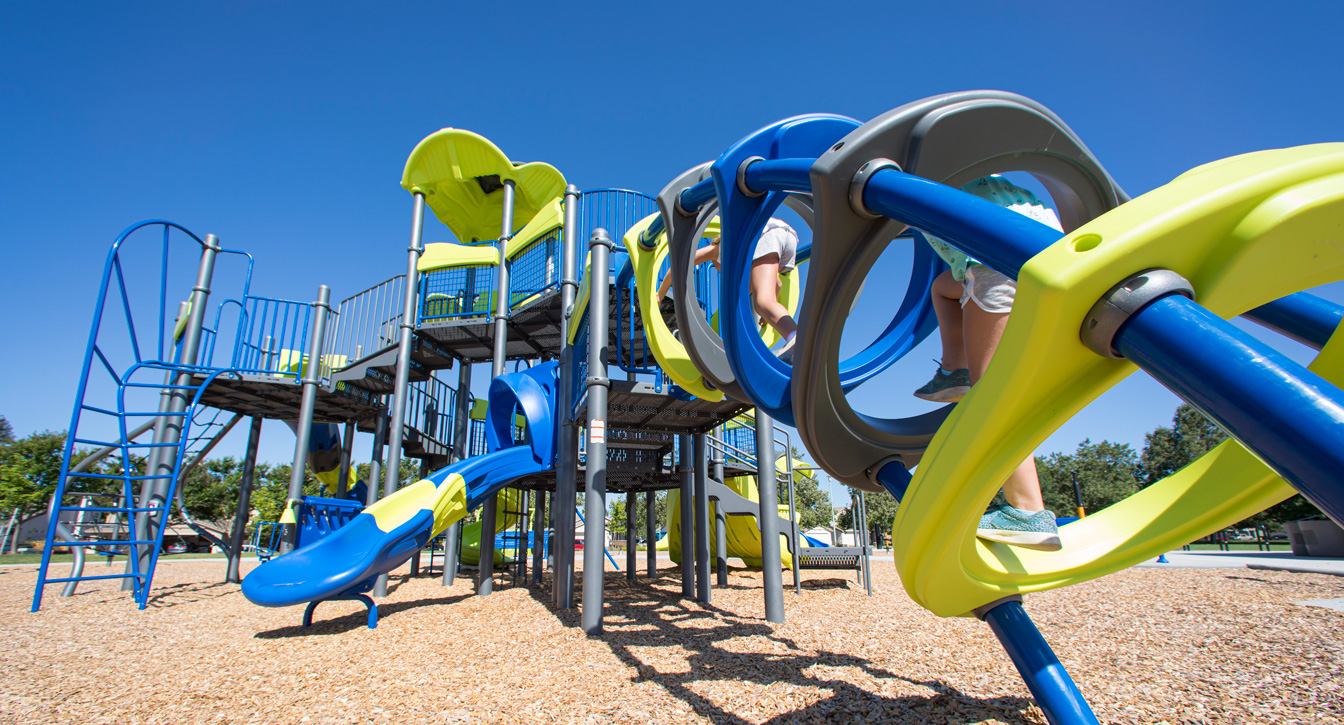
 Parents enjoy days in the sun, listening to the sound of laughter as kids swing and climb the days away in their favorite playground. To parents, playgrounds are a great resource for fun and activity, but for kids they are an important part of childhood development. Exactly why are playgrounds important for kids?
Parents enjoy days in the sun, listening to the sound of laughter as kids swing and climb the days away in their favorite playground. To parents, playgrounds are a great resource for fun and activity, but for kids they are an important part of childhood development. Exactly why are playgrounds important for kids?
Experts Weigh in On Why Playgrounds are Important for Kids
“Play is the highest form of research.” Credited to Albert Einstein
Author Tom Norquist discovered a direct correlation between inventors, their inventions, and free play in a playground setting. “Why,” Tom questions, “is it seemingly forgotten that it is unstructured play that has such an impact on intelligence, education, and social skills?”
Tom isn’t alone in identifying free play as a solid foundation for a child’s success later in life. In 2014, Duerr Evaluation Resources found that playgrounds provide a vital link to social and motor skills, as well as brain development. Playgrounds, the research found, accelerate all types of learning and are important for a child’s emotional, cognitive, and physical development. This report found that “playing promotes brain development and helps lay the neural grid for a successful mind through repetitive play actions that reinforce that grid.”
Since 1885, studies show that active play increases student performance. The Novelty Arousal Theory addresses enhanced learning in children who experience a change of pace. This same study found that children who experienced “play” breaks, such as playground time and recess, were less fidgety and more focused on tasks.
How Are Playgrounds Important for Kids?
Playgrounds are more than just fun for our children. They are vitally important parts of early emotional, physical, and cognitive development.
Emotional Benefits of Playgrounds
It’s hard to think about what a child may be “stressed” about, but the fact remains that many kids are stressed. Common stressors may be school, money, and the future. Many times, the signs of stress in kids (sleep disorders, headache, GI upsets and stomach pain) aren’t recognized by parents.
It’s been found that unstructured play time on playgrounds reduces stress by giving kids a chance to productively and safely blow off steam while enjoying the natural calming properties of being outdoors. Mastery of playground equipment gives kids a boost in self-confidence and self-esteem, too. These kids have a sense of controlling their environment in unstructured play, even though they have no control over other stressors in their lives. “Play is how children make sense of the world.” (Hammond, 2012).
Playgrounds Have Physical Benefits for Kids
Physical activity keeps kids healthy, and letting them play outside in the sunshine boosts immune function, reduces the risk of obesity, builds stamina, improves blood flow to the brain, and increases cardiovascular health. These are all common physical benefits of playground activity, but the reasons to encourage physical play are deeper than you would think.
Playgrounds teach kids balance, hand-eye coordination, and visual perception. Outdoor play encourages kids to develop grip strength, upper body strength, and coordination. Jumping, landing, grasping, stretching, and reaching are all key to physical health and developing healthy habits that will last a lifetime.
Playgrounds and Social Benefits
Playgrounds are a universal location for kids. They are not limited by racial or economic lines and as such can be integral to helping kids keep an open mind and avoid developing biases that could last a lifetime. Their unique ability to level the social playing field makes playgrounds important for kids, as children can play with kids from all sorts of backgrounds with little to no adult interference. This independence in social interaction is key to preventing parental biases from impacting children.
Shifts in the structure of families have also stunted children, with a smaller age gap all but eradicating the ability of elder siblings to act as teachers to their juniors. Playgrounds can help foster skills of leadership and cooperation in ways that would usually be done among siblings, as kids from all different age brackets can play together and learn from one another. Kids can learn from their older playmates and, as they get older, teach things to their younger peers in a generational model that grade-separated schools simply cannot provide.
Playgrounds Develop Valuable Life Skills
Kids on playgrounds usually develop games that involve a “team” mindset, with the end goal of solving problems together rather than “I win”. This is key to developing the life skills of teamwork, diplomacy, cooperation, and leadership that they will need to succeed.
While our kids are expanding knowledge and skill sets through exploration and risk-taking, they are also learning the value in self-control, empathy, and sharing. Children also learn how to cope with things such as failure and disputes on the playground, giving them a solid basis for the coping skills they will use throughout their lives.
Overcoming Society’s “New Norm” of Socializing
Kids as young as three or four are becoming more reliant on screens, from gaming to TV and, as they get older, social media platforms. There are benefits to technologies, of course, but the biggest disadvantage of screen time for our kids is a lack of real time “in-person” social interaction.
The American Academy of Pediatrics recommends children get at least one hour of unrestricted play time per day. Social interaction is necessary for kids to learn the life, people, and social development skills they need to succeed in life.
Cognitive Development, Kids, and Playgrounds
Free play in a playground setting encourages kids to use their imaginations and creativity, which will enhance their critical thinking, memory, and problem solving skills. Playgrounds also frequently offer sensory experiences such as sand, water, and textures which nurture their need to touch and feel the world around them.
Kids in playgrounds are also expanding their language and communication skills.
Kids who take breaks from learning to play return to their tasks better focused and better able to recall learned information. In fact, many countries have enjoyed educational success by allowing fifteen minutes of free play for every 45 minutes of instruction. It’s even been suggested that the age-old parental instruction, “finish your homework before you go outside to play,” is in direct opposition to the way kids think, learn, retain, and recall information.
Playground Equipment Helps All Stages of Childhood Development
In order to reach kids in all the stages of developmental play, playgrounds should have equipment that stimulates each age group.
- Under two: Equipment should focus on gaining strength, balance, and motor skills as well as interactive play with parents or caregivers
- From two to five: Playground equipment should start incorporating elements that encourage physical activity and creative, problem solving ways of thinking
- Five to twelve years: Playground equipment blends all elements of play, including climbing, coordination, social skills, problem solving, and physical agility
- Teens: Teens need play, too, and these kids need physically and mentally challenging fitness-oriented equipment
Are Your Kids Playing Enough?
Now that you understand why playgrounds are important for kids, we have one question for you: are your kids playing enough?







